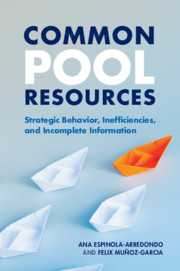Book contents
- Frontmatter
- Contents
- List of Figures
- List of Matrices
- Preface
- 1 Introduction
- 2 Common Pool Resources in a Static Setting
- 3 Common Pool Resources in a Dynamic Setting
- 4 Entry Deterrence in the Commons
- 5 Repeated Interaction in the Commons
- 6 Commons under Incomplete Information
- 7 Signaling in the Commons
- Appendix A Game Theory Tools
- Appendix B Solutions to Selected End-of-Chapter Exercises
- Bibliography
- Index
6 - Commons under Incomplete Information
Published online by Cambridge University Press: 03 August 2023
- Frontmatter
- Contents
- List of Figures
- List of Matrices
- Preface
- 1 Introduction
- 2 Common Pool Resources in a Static Setting
- 3 Common Pool Resources in a Dynamic Setting
- 4 Entry Deterrence in the Commons
- 5 Repeated Interaction in the Commons
- 6 Commons under Incomplete Information
- 7 Signaling in the Commons
- Appendix A Game Theory Tools
- Appendix B Solutions to Selected End-of-Chapter Exercises
- Bibliography
- Index
Summary
INTRODUCTION
Previous chapters assumed that firms perfectly observe all relevant information necessary to operate in the CPR, such as the available stock or the cost externality that they suffer from their rivals’ appropriation. Firms interacted in a complete information game, either simultaneously or sequentially, facing no uncertainty about their own profit function or their rivals’. While such a model can be justified in commons where several firms have operated for long periods, and where technologies are well-known, it may not be a good description of CPRs where all (or some) firms have started to operate and/or have limited experience exploiting a similar resource. In that setting, firms face uncertainty about how abundant the resource is, since their technology does not provide a precise estimate of the stock, but instead a distribution of possible stocks, each with an associated probability (i.e., a probability distribution over stocks).
This chapter explores settings where all firms face uncertainty about the available stock, and must choose their appropriation decisions without observing the exact stock. Firms may, of course, have estimates of this stock, but do not know it with certainty. In this context, firms maximize their expected profits, taking into account the probability associated with each stock level. We find equilibrium appropriation in this setting, and compare it against that arising under complete information, identifying in which cases firms exploit the resource more or less intensively when they operate under uncertainty than otherwise.
We then study another context of incomplete information where, rather than having all firms being uninformed about the stock, only one firm is uninformed while its rival – having more experience exploiting the CPR – observes the available stock. This creates an information asymmetry that the privately informed firm may exploit to its benefit. Similarly, as in our previous discussion, we find equilibrium appropriation in this setting, which involves a stock-dependent appropriation for the informed firm but a stockindependent appropriation for the uninformed firm. Intuitively, the informed (uninformed) firm can (cannot) condition its exploitation decision on the stock level since it can (cannot, respectively) observe the available stock.We also compare equilibrium appropriation under complete and incomplete information, and evaluate if the static inefficiencies we found in Chapter 2 are ameliorated or augmented by the presence of incomplete information.We finish the chapterwith a review of the literature testing CPRs under incomplete information in controlled experiments.
Information
- Type
- Chapter
- Information
- Common Pool ResourcesStrategic Behavior, Inefficiencies, and Incomplete Information, pp. 81 - 94Publisher: Cambridge University PressPrint publication year: 2021
